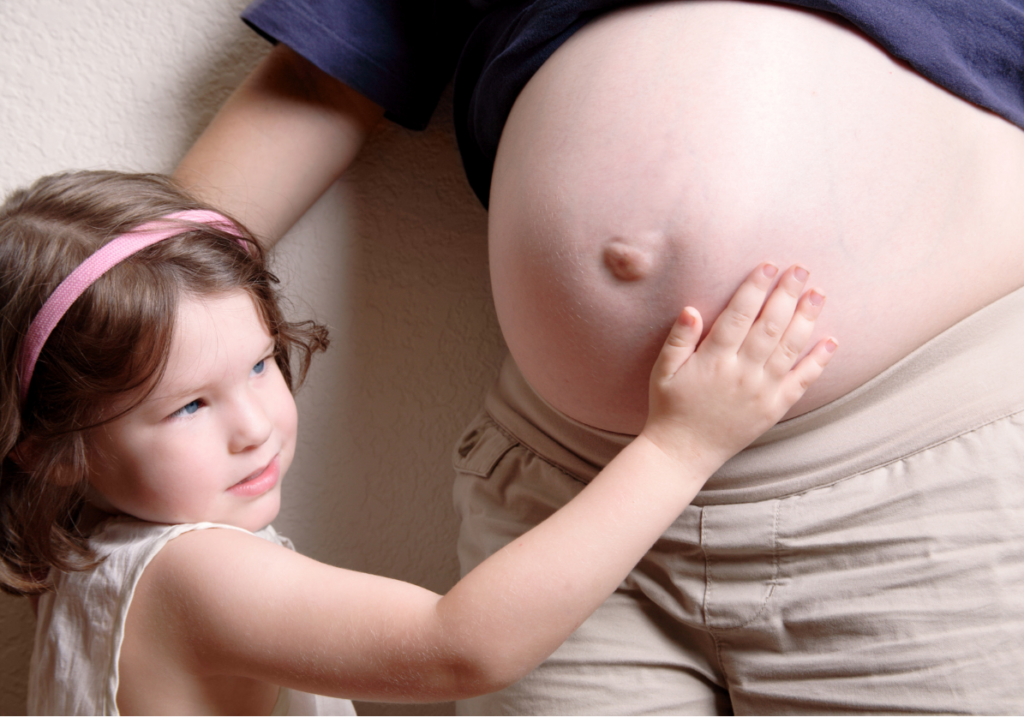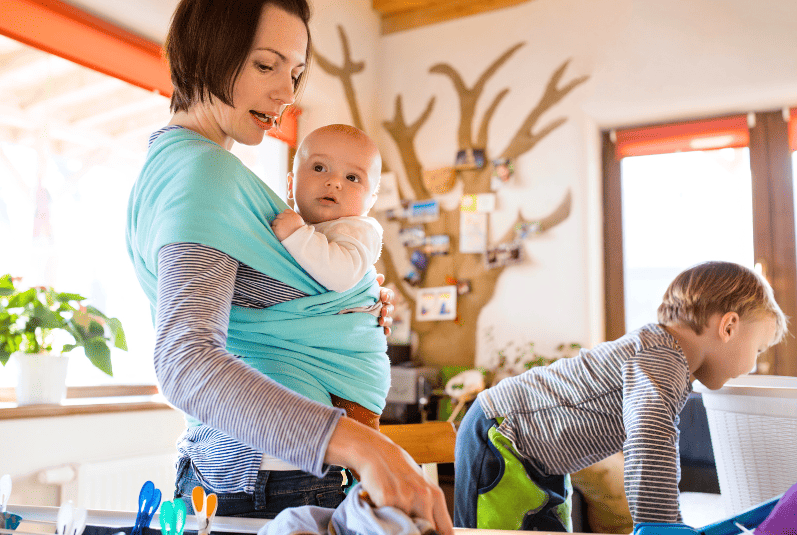Bringing a new baby home brings many joys, but also many challenges. If you have older children, one of those challenges may be helping your toddler or older child accept the new baby. This is a tough transition for many families, so you are definitely not alone in the struggle! Here are all our doula-approved tips for introducing your new baby to their older sibling(s) and supporting that transition.

Preparing the Older Sibling for the Arrival of the New Baby
During your pregnancy, talk often to your child about the new baby and the upcoming changes. Use your judgment around their developmental level – some toddlers may have trouble understanding, but they are often very attuned to changes occurring in the family dynamic. You might want to delay telling them until you are showing more obviously so it makes more sense to them.
Try including the older sibling in the process in some way – having them touch your bump, feel the baby, sing to the baby, etc. Use books and stories to introduce the concept of being an older brother or sister. They will love to feel involved by helping pick out clothes, toys, or nursery décor.
Prepare them for the upcoming change by explaining what having a new baby sibling will be like. “Little babies need to be held all the time. They sleep a lot, eat a lot, and will cry sometimes.”
Tips for the First Meeting
The first time your children meet is a special moment. It can be helpful to try to have the baby in a bassinet (ie. not being held by mommy/daddy) to avoid sparking jealousy right off the bat. This way, your arms are available to cuddle and reassure the older sibling. Some families plan for a sibling “gift exchange” to help the big sibling feel included and important. Avoid the urge to correct any negative emotions your toddler may be having – it’s not always love at first sight for siblings and that’s okay. It will get better with time.
Creating a Bond Between Siblings
Encourage bonding activities between siblings. The older sibling can be given some age-appropriate tasks to help out, such as picking out a book to read to the baby, helping bathe the baby, fetching items from another room, etc. This will encourage a healthy self-esteem and feeling like an important member of the family.
Try to avoid “blaming” the baby for not being able to do what your toddler asks. Instead of saying “I can’t play with you right now because I’m feeding the baby”, say something like, “I’d love to play with you in 5 minutes! I’m almost done – can you go get the game ready?”
Dealing with Jealousy and Resentment
Despite all your best efforts, chances are there will be moments of jealousy and resentment in your older child. It’s important to acknowledge and normalize any emotions they are feeling. Letting them express themselves often helps the feeling to lose some intensity. Give them tools to help process their feelings – such as deep breathing, hugs, sensory activities, colouring/drawing, etc.
Try to anticipate when big feelings might happen (late afternoon through to bedtime is a common time) and take steps to prevent them. Perhaps your partner or another family member or friend can take the older sibling out to the park or backyard for some special one-on-one time before dinner.
If you are dealing with an aggressive toddler, know that it is developmentally normal for toddlers to have trouble controlling their impulses to hit the baby. Therefore, you must be vigilant about not leaving the baby alone with the toddler and try to identify triggers and intervene before your toddler lashes out. Toddler aggression towards a baby can be very triggering for parents, so please seek out help if you are struggling with this.

Balancing Attention and Responsibilities
Try to make sure you are spending one-on-one time with your older child. Even 10 minutes of special, uninterrupted play time will go a long way in making them feel loved.
It can feel almost impossible to find enough time for both your children, especially in the fourth trimester period. This is why we encourage you to seek out as much help as possible from friends and family, or a postpartum doula. Don’t feel guilty about neglecting housework; your baby and toddler need you at this critical transition time.
Wearing your baby in a sling or baby carrier can be very helpful – you will have 2 arms free to play with your toddler or prepare food.
If your toddler is old enough, they might be able to help you with certain baby-related tasks, such as fetching diapers or burp cloths. Make sure to praise their efforts to be helpful. You can even talk to the new baby about what a great big sibling they have when you know your toddler will overhear – they love this.
It can be helpful to have a special bin of new toys or activities that you bring out for your toddler only when you are nursing or feeding the baby. The toys don’t have to be fancy or expensive – just as long as they are novel and kept solely for feeding time. Try doing a toy swap with a friend to keep the bin interesting.
The Power of Positive Reinforcement
One of the best ways to influence toddler behaviour is through positive reinforcement. Make sure you praise your older child for their good behaviour, especially when it involves the baby. If you see them using gentle hands or if they help you set the table for dinner, make a big deal about it! This goes a long way.
Try to avoid shaming or harshly punishing the older child for their behaviour. Using natural consequences or age-appropriate time outs are research-backed methods of discipline.
Balancing Birth to Baby offers a Toddler Workshop which can help immensely with sibling issues and challenging behaviour. We also offer our Birthin’ Again class, which covers several topics related to this transition (introducing siblings to baby, dealing with sleep with multiple children, etc), as well as a review of prenatal class content.
It Will Get Easier
Though the initial transition will probably have some difficult moments, rest assured that this stage won’t last forever. Patience and a consistent approach with your toddler will pay off over time.
The day will come when you will get to witness your children experiencing the joys of siblinghood. Is there a better gift you could give your children than a lifelong friend?
